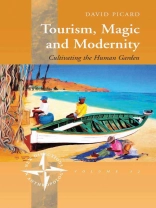Drawing from extended fieldwork in La Réunion, in the Indian Ocean, the author suggests an innovative re-reading of different concepts of magic that emerge in the global cultural economics of tourism. Following the making and unmaking of the tropical island tourism destination of La Réunion, he demonstrates how destinations are transformed into magical pleasure gardens in which human life is cultivated for tourist consumption. Like a gardener would cultivate flowers, local development policy, nature conservation, and museum initiatives dramatise local social life so as to evoke modernist paradigms of time, beauty and nature. Islanders who live in this 'human garden’ are thus placed in the ambivalent role of 'human flowers’, embodying ideas of authenticity and biblical innocence, but also of history and social life in perpetual creolisation.
Spis treści
Foreword
Nelson Graburn
Preface
Introduction: Penguins in the Paris Underground
Part I: Aestetic Transfigurations
Chapter 1. Tourism and Magic
Chapter 2. Creole Beautiful
Chapter 3. Cultivating Society as Human Garden
Part II. The Hospitality of the Garden
Chapter 4. Hospitality and Love
Chapter 5. Bougainvilleas at the Riverside
Chapter 6. Poachers in the Coral Garden
Part III. Cultivating the Human Garden
Chapter 7. History as an Aesthetics of Everyday Life
Chapter 8. Towards a Global Gardening State
Bibliography
Endnotes
O autorze
David Picard is a Senior Research Fellow at the Centre for Research in Anthropology (CRIA) at New University of Lisbon, Portugal. He holds a Ph D in anthropology from the University of La Reunion, Indian Ocean and has been a Visiting Scholar at the University of California, Berkeley.












